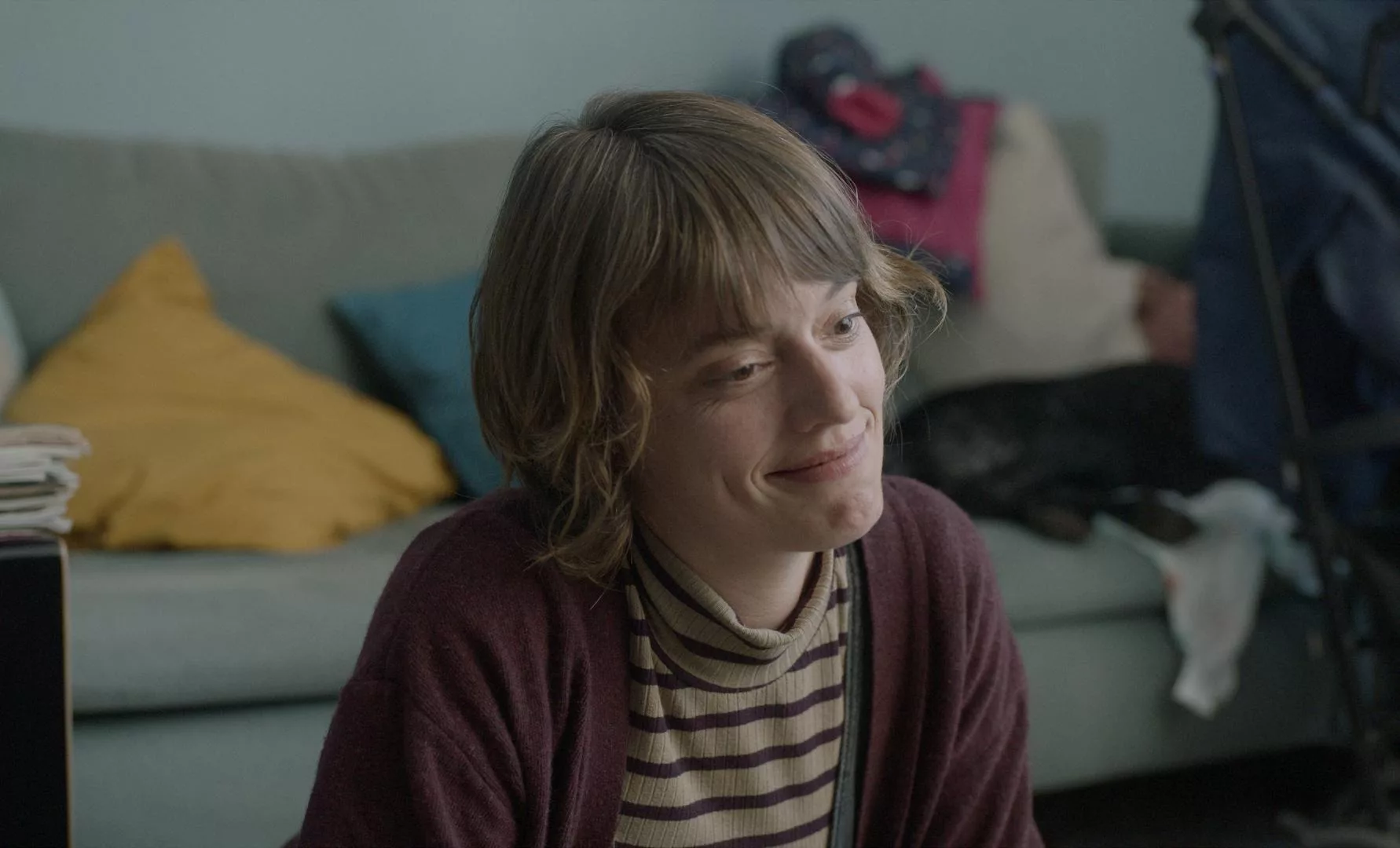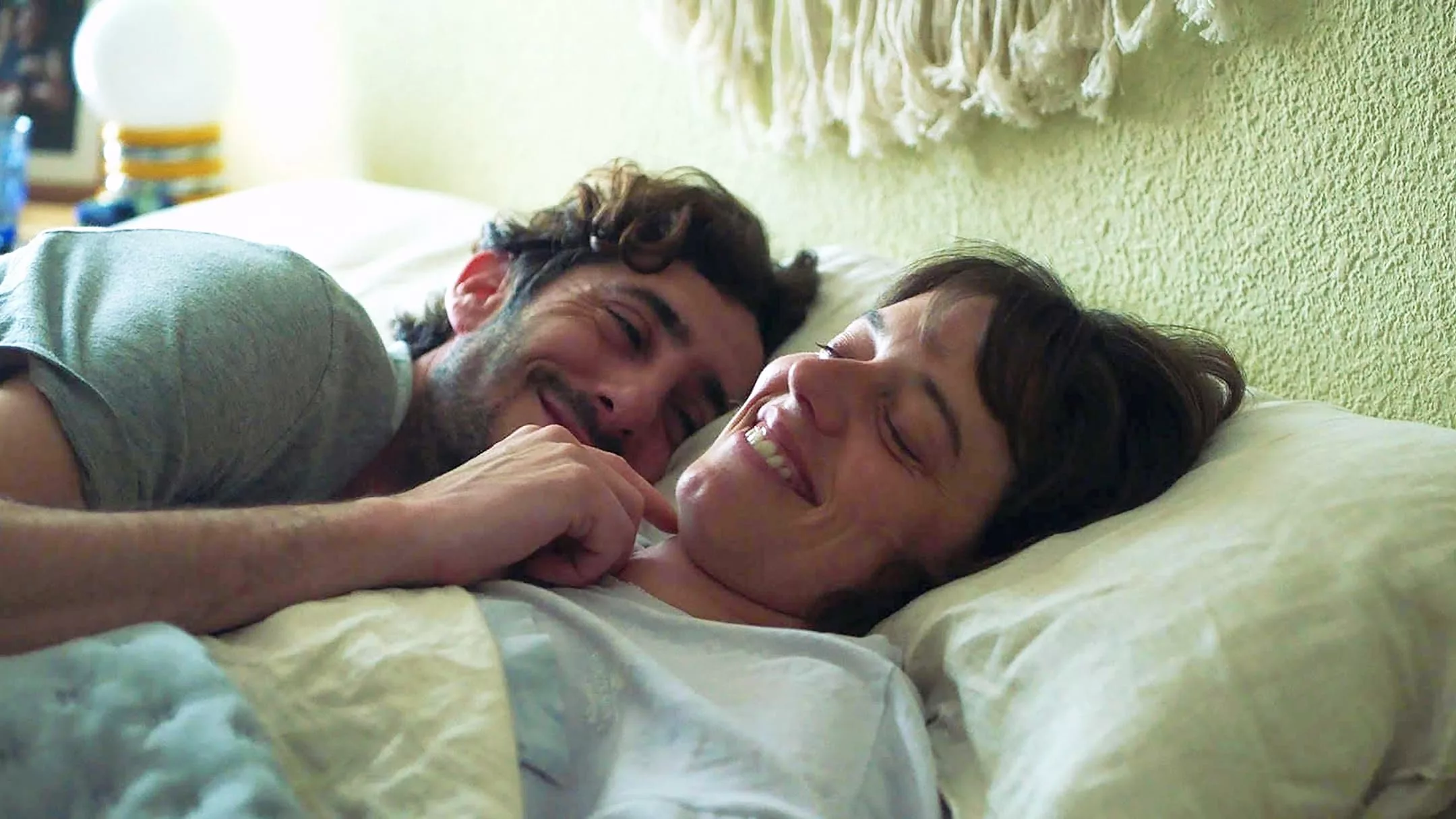Lola’s life takes an unexpected turn in Liliana Torres’ Mamífera. As a graphic designer living in Barcelona, the 40-year-old is content with her work and long-term relationship. But during a routine checkup, Lola discovers she’s ten weeks pregnant—a surprise, as she’s never wanted children.
Her partner Bruno is supportive of whatever she decides, but in Spain, she must consider her options for three days under existing laws. As Lola ponders motherhood against her original desires, friends and family start weighing in too. Most know Lola as happy and fulfilled without kids. But societal expectations often see women’s roles solely as mothers.
Through intimate scenes and Rodriguez Soto’s nuanced performance, we experience Lola’s deep reflection. Her close friendships provide perspective from different motherhood experiences. Animations express Lola’s thoughts in dreamlike fashion. In the end, Lola makes a choice that feels right for her future. But Torres ensures viewers understand that whichever option a woman chooses deserves respect. By focusing on one woman’s realities, Mamífera sparks thoughtful discussion around pressing issues that still challenge gender roles.
Facing Motherhood
We’re immediately drawn into Lola’s calm, comfortable life in Barcelona. As an art professor, she occupies herself with creative work and cherishes moments alongside Bruno. Never expressing a desire for children, Lola defines herself through relationships and her career.
Rodriguez Soto embodies Lola with a charming warmth. Her natural, easygoing nature leaves us feeling like we’re among old friends. Yet within lies a resolute independence, while happy, needing no label of mother to find purpose. When pregnancy strikes, Lola’s world is upended.
By her side stands the loyal Bruno, played sensitively by Auquer. He looks past society’s views, supporting Lola without condition. As her due date nears, we notice his bond strengthening. Does fatherhood appeal where it never did before?
Lola finds perspective through diverse friends. Alarcón plays a mother exhausted from life’s demands. Ribera and Bertran hope to conceive, highlighting fertility’s randomness. Most intriguing is Llopis’ Judit, trying IVF after years of hoping. Witnessing friends’ journeys, Lola feels the weight of her choice.
Guiding Lola through turmoil is her mother, portrayed by Fernández with gentle empathy. She is neither pushy nor detached; she offers stability. We feel Lola is fortunate to have such a caring confidant.
As Lola sifts options, those around her challenge preconceptions. Would she be content never knowing motherhood? Is fulfillment found on other paths? By the film’s end, Lola alone decides her happiness, and we respect whichever choice frees her spirit most.
Crafting Lola’s World
Director Torres opts for a thought-provoking visual style. Behind the lens, C. Pan guides us with a steady gaze, hanging back to observe Lola’s journey unfold naturally. Raw and authentic, her camerawork sets the tone—this is no flashy story, but one requesting our patience and empathy.
Yet sprinkled throughout are flourishes of magic. Garcés Larraíncrafts dreamlike animations, surreal landscapes emanating from Lola’s psyche. Images are haunting and entrancing; we see her subconscious wrestling with fears and desires. As cut-paper characters representing Lola’s doubts float by, a more creative side of her personality emerges.
Subtle details enrich everyday scenes. Guirao’s costuming captures the era through modest yet stylish looks. Besora fills apartments with objects exuding warmth and creativity, a world Lola feels comfortable in. Villaró’s gentle score, rising during conflicts, guides us to reflect on undertones bubbling beneath surface serenity.
Together, these elements forge a space for introspection. Lola’s world, though troubled now, remains a sanctuary we’re invited to know deeply. As she moves towards understanding herself, we see life’s intricacies woven with care into Mamífera’s thoughtful visual design.
The Weight of 72 Hours
Mamífera centers around a unique three-day structure as Lola ponders motherhood unexpectedly thrust upon her. Though brief, these 72 hours profoundly impact the narrative. Director Torres crafts them into a microcosm, granting insight into Lola’s dilemma.
We first meet carefree Lola, unprepared for impending change. Learning of her pregnancy comes as a shock, dismantling assumptions. But Spain’s old law requires thinking, not rushing, so Lola embarks on introspection.
Each passing moment carries significance during this brief reflective window. Will she alter life’s course or maintain the status quo? Friends hold opinions, and society pressures its ideals, but this is Lola’s choice alone. Repeated scenes alone allow her innermost thoughts to surface, doubts and questions mingling.
Torres handles the scenario delicately and without judgement. Lola’s situation resonates deeply, whether we’ve faced it ourselves or not. Neither path holds easy answers. By the story’s end, Lola emerges enlightened regardless of the resolution, and ownership over her future is secured.
Conflict arises not from external forces but from within; we witness an individual navigating life’s complexities. Though tensions mount with the clock, the calm pace honors Lola’s exploration. Flashbacks provide context, and dreams illuminate subconscious longing. Supportive performances enhance our understanding of all perspectives.
Mamífera triumphs through its compassionate, balanced portrayal. Lola’s plight feels authentically grounded, not glorified or politicized, for the very real issues at its heart deserve sensitive treatment. Her poignant character study is elevated by this intentionally tight structural framework, a masterful display of storytelling nuance.
Bringing Lola to Life
At the heart of Mamífera lies María Rodriguez Soto’s powerhouse performance as Lola. Handling a role exploring motherhood’s complexities would challenge any actor, but Soto rises superbly to the task.
From the outset, her embodiment of Lola feels genuine. We recognize aspects of ourselves and people we know in the character. Her relationship with Bruno oozes warmth through tender touches and caring gestures. But an unforeseen pregnancy upends Lola’s world, and here Soto’s prowess becomes evident.
Navigating turbulent inner conflicts, she conveys an array of raw emotions through expressive yet understated work. We empathize as confusion, fear, and doubt stir within. Even in tear-filled moments, Soto maintains Lola’s grounded essence. The inner turmoil never overwhelms—wwe witness a real woman grappling with monumental life decisions.
Director Torres also deserves praise. Her minimalist direction trusts nuanced acting to drive the sensitive narrative. Heavy-handedness could have compromised the story, but Torres steers it with subtle care. Respecting the topic’s intimacy, she frames scenes to be uncompromising yet never voyeuristic.
The script avoids painting Lola’s journey in black and white. Soto finds complexity in every exchange and every fleeting thought reflected on her face. Whether considering an unfamiliar path or going with instincts, Lola’s humanity remains central. This balanced approach lets viewers engage freely with the issues at hand.
Together, Rodriguez, Soto, and Torres craft an empathetic portrait that does justice to the real diversity of women’s experiences. Through an underplayed but powerfully emotive performance, Soto brings Lola’s reality to our screens with graceful authenticity.
Navigating Expectations
Mamífera delves into complex themes that many women can relate to. At its core lie the expectations society imposes regarding motherhood.
From an early age, locals encourage Lola’s friends to start families. While some embrace this path happily, Lola knows motherhood isn’t for her. Yet constant remarks leave her questioning her choice. Does choosing another way make her abnormal?
The film portrays these social pressures deftly. Subtle interactions reveal ingrained biases that weigh heavy on the childless. Lola’s blissful lifestyle is suddenly judged for its perceived “emptiness.”
Her unplanned pregnancy intensifies this scrutiny. Where Lola sees disruption, doctors view an “ideal” candidate for parenting. Family and colleagues pressure alternatives once private. Torres asks us to reflect on how these biases influence the most personal of decisions.
When Lola faces terminating the pregnancy, she stands up for the importance of bodily autonomy. In doing so, she challenges the notion that womanhood requires motherhood. Her steadfastness speaks to women who feel their worth isn’t defined by having children.
By handling Lola’s turmoil with care, Torres highlights stigmas too often ignored. She presents motherhood and childlessness as equally valid choices deserving of respect. Both demand sacrifices and prompt difficult conversations.
Through Lola’s journey, Mamífera encourages us to broaden our narrow views. It sees people’s life paths as deeply personal, not for others to scrutinize or dictate. In reaffirming individual agency, the film empowers all women to define womanhood on their own terms.
Choices That Resonate
Mamífera tells a story that will linger with you. At its core lies Lola’s intensely personal journey, brought to life through Rodríguez Soto’s captivating performance.
Faced with motherhood unexpectedly, Lola stays true to herself through difficult days. Rodríguez Soto ensures we feel every conflicting thought. Her nuanced work draws us tightly into Lola’s world. We understand each swelling emotion, debate and doubt.
The film asks us to open our eyes. Through compassionately handling taboo topics, it sparks vital discussions. We see how societal pressures can overwhelm the most personal decisions. Lola’s circumstances may differ from our own. Yet Torres invites us to challenge preconceptions through her lenses.
Mamífera never claims one path superior. It presents motherhood and childlessness as complete experiences deserving equal respect. Both demand sacrifices and prompt soul-searching. The film finds power in acknowledging life’s complexity rather than oversimplifying.
After spending time with Lola, it’s hard not to feel empowered by her strength. Rodríguez Soto brings an inspiring heroine to screens. One who stays thoughtful through turmoil and owns her choices completely. Her performance leaves an impression that will echo for some time.
While addressing weighty themes, Mamífera remains overwhelmingly warm and human. It reminds us that discussions progress most when approached with care, honesty, and nuance. Lola’s story will continue fueling such discussions and ensuring all women feel free to define their lives as they see fit. Its messages of empowerment and understanding deserve wide audiences.
The Review
Mamífera
In summary, Mamífera tells a compelling personal story that illuminates important societal issues with nuance, warmth, and sensitivity. Anchor María Rodríguez Soto delivers a deeply moving performance, bringing director Liliana Torres' thoughtful script to vivid life. While addressing weighty themes, the film remains overwhelmingly humane. It proves that starting meaningful discussions requires empathy, honesty, and an open mind.
PROS
- Nuanced portrayal of its complex themes around societal expectations and personal choice
- Outstanding central performance by María Rodríguez Soto that anchors the film
- Raises important discussions in a thoughtful manner without judgment.
- Feels genuinely human in its empathetic storytelling
CONS
- Some may find certain dream sequence visuals overly intrusive.
- Weighty topics could have benefited from more time to fully explore.
- There is potential for some viewers to find the film's pacing slightly rushed.





















































